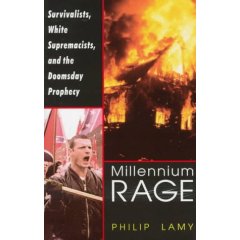|








|
General Academic Books & Articles
- Brennan, Teresa, "The Age
of Paranoia," Paragraph, 14 (1991), 20-45
- Bywater, William, "The Paranoia
of Postmodernism," Philosophy and Literature,
14 (1990), 79-84
- Carroll, John, Puritan, Paranoid,
Remissive: A Sociology of Modern Culture (London:
Routledge & Kegan Paul, 1977)
-
 Carroll,
Noel, "Conspiracy Theories of Representation,"
Philosophy of the Social Sciences, 17 (1987), 395-412 Carroll,
Noel, "Conspiracy Theories of Representation,"
Philosophy of the Social Sciences, 17 (1987), 395-412
- Cubitt, Geoffrey, The Jesuit Myth:
Conspiracy Theory and Politics in Nineteenth-Century France
(Oxford: Clarendon Press, 1993)
- Davis, David Brion, ed., The Fear
of Conspiracy: Images of Un-American Subversion from the
Revolution to the Present (Ithaca: Cornell University
Press, 1972)
- Eagleton, Terry, "Capitalism,
Modernism and Postmodernism," in Against the Grain
(London: Verso, 1986), pp.131-48
- Elaine Showalter, Hystories: Hysterical
Epidemics and Modern Culture(New York: Columbia University
Press, 1997)
- Fields, Ingrid Walker, "Paranoia,
Politics, and the Popular Imagination: Conspiracy in Contemporary
American Literature" (unpublished PhD diss., University
of California, Santa Cruz, 1993; abstract in DAI,
53 (June 1993), 4325A)
- Fisher, Linda, "Hermeneutics
of Suspicion and Postmodern Paranoia: Psychologies of
Interpretation," Philosophy and Literature,
16 (1992), 106-114
- Fiske, John, "Blackstream Knowledge:
Genocide," in Media Matters: Everyday Culture
and Political Change (Minneapolis: University of Minnesota
Press, 1994), pp.191-216
- Freud, Sigmund, "Psychoanalytic
Notes on an Autobiographical Account of a Case of Paranoia
("Schreber")" (1911), trans. James Strachey,
rvd. Angela Richards, in Penguin Freud Library, 15 vols
(Harmondsworth: Penguin, 1985), IX, pp.131-226
- Fried, Yehuda, and Joseph Agassi,
Paranoia: A Study in Diagnosis, no. 50 of the Boston
Studies in the Philosophy of Science (Dordrecht, Holland:
D. Reidel, 1976)
- Goode, Eric, and Nachman Ben-Yehuda,
Moral Panics: The Social Construction of Deviance
(Oxford: Blackwell, 1994)
- Grauman, Carl F. and Serge Moscovici,
eds, Changing Conceptions of Conspiracy (New York:
Springer-Verlag, 1987)
- Harper, David J ., "Histories
of Suspicion in a Time of Conspiracy: A Reflection on
Aubrey Lewis’ History of Paranoia," History
of the Human Sciences 7 (1994), 89-109
- Hofstadter, Richard, The Paranoid
Style in American Politics and Other Essays (New York:
Alfred A. Knopf, 1965)
-
 Jameson,
Fredric, "Cognitive Mapping," in Marxism
and the Interpretation of Culture, Cary Nelson and
Lawrence Grossberg, eds (Basingstoke: Macmillan, 1988),
pp.347-58 Jameson,
Fredric, "Cognitive Mapping," in Marxism
and the Interpretation of Culture, Cary Nelson and
Lawrence Grossberg, eds (Basingstoke: Macmillan, 1988),
pp.347-58
- Jameson, Fredric, Postmodernism,
or, The Cultural Logic of Late Capitalism (London:
Verso, 1991)
- Jameson, Fredric, The Geopolitical
Aesthetic: Cinema and Space in the World System (Bloomington
and Indianapolis: Indiana University Press, and London:
BFI, 1992)
- Knight, Peter, "Naming the Problem:
Feminism and the Figuration of Conspiracy," Cultural
Studies 11 (1997), 40-63
- Knight, Peter, "Plotting the
Sixties: The Culture of Conspiracy in the USA" (unpublished
DPhil thesis, University of York, 1995)
- Knight, Peter,
Conspiracy
Culture from Kennedy to the X-Files, 2000
- Knight, Peter
(eds), Conspiracy
Nation: The Politics of Paranoia in Postwar America,
2002
- Knight, Peter (eds), Conspiracy
Theories in American History: An Encyclopedia,
2003
- Lamy, Phillip, Millennium Rage:
Survivalists, White Supremacists and the Doomsday Prophecy
(Da Capo Press, 1986)
- Lasch, Christopher, The Minimal
Self: Psychic Survival in Troubled Times (1984; London:
Picador, 1985)
- MacDonald, C.M., "The Politics
of Paranoia: America and the Americans," History
Today, 34 (1984), 5-9
- Mirowsky, John, "Paranoia and
the Structure of Powerlessness," American Sociological
Review 48 (1983), 228-239
- Moore, Pamela, and Devoney Looser,
"Theoretical Feminism: Subjectivity, Struggle, and
the ‘Conspiracy’ of Poststructuralisms,"
Style, 27 (1993), 530-58
- Patricia Turner I Heard It through
the Grapevine:
- Pigden, Charles, "Popper Re-visited,
or What is Wrong with Conspiracy Theories," Philosophy
of the Social Sciences , 25 (1995), 3-34
- Pinsker, Sanford, "America’s
Conspiratorial Imagination," Virginia Quarterly
Review 68 (1992), 605-25
- Popper, Karl, "Prediction and
Prophecy in the Social Sciences," in Conjectures
and Refutations (London: Routledge & Kegan Paul,
1963), pp.336-46
- Popper, Karl, "Towards a Rational
Theory of Tradition," in Conjectures and Refutations
, pp.120-35
- "Postmodernity and Paranoia,"
Editorial, American Philosophical Quarterly, 49
(1990), 480-88
-
 Rogin,
Michael, "Ronald Reagan, The Movie"; and
Other Episodes in Political Demonology (Berkeley and
Los Angeles: University of California Press, 1987) Rogin,
Michael, "Ronald Reagan, The Movie"; and
Other Episodes in Political Demonology (Berkeley and
Los Angeles: University of California Press, 1987)
- Ross, Andrew, Strange Weather:
Culture, Science and Technology in the Age of Limits
(London: Verso, 1991)
- Sasson, Theodore "African American
Conspiracy Theories and the Social Construction of Crime"
Sociological Inquiry, 65 (1995), 265-285
- Schor, Naomi, "Female Paranoia:
The Case for Psychoanalytic Feminist Criticism,"
Yale French Studies, 62 (1981), 204-219
- Smith, Paul, Discerning the Subject
(Minneapolis: University of Minnesota Press, 1988)
- Stern, Kenneth, A Force Upon the
Plain: The American Militia Movement and the Politics
of Hate (NY 1996)
- Swanson, David, Philip Bohnert and
Jackson Smith, The Paranoid (Boston: Little, Brown
& Co., 1970)
- Wood, Gordon, "Conspiracy and
the Paranoid Style: Causality and Deceit in the Eighteenth
Century" William and Mary Quarterly, 39 (1982),
401-441
Return
to bibliography
|